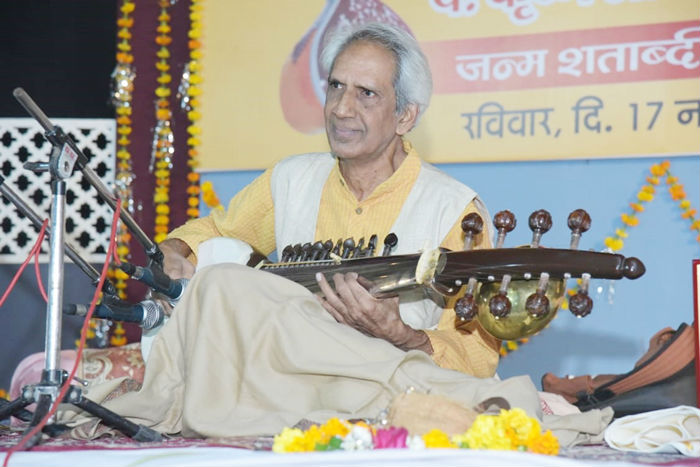Music for God -realisation

1. Introduction to Mr. Pradip Barot


1 A. The legacy of music and lessons in
sarod playing, from Mr. Vasant Rai and Ma Annapurnadevi
Music runs in the blood of Mr. Pradip Barot. His grandfather, Pandit Rodji Barot was a renowned sarangi player and the honorary musician of the Ratlam royal family. His father Mr. Mohanlal Barot would play the sarangi, flute, clarinet, saxaphone etc and would also sing. As, the environment at home of Pradip Barot was music-oriented he had exposure to music since childhood. His father decided that Pradip should learn the sarod. The first few years Pradip received training from Mr. Vasant Rai. Further training was received from Padmabhushan awardee Maa Annaourna Devi daughter of Baba Allaudin Khan, Propagater of from Maihar family. Till date he Mr. Barot has done many sarod performances both in India and abroad.
1 B. Mr. Pradip Barot who was brought up
with the teaching that music is an easy medium of realising
God plays the sarod with the spiritual emotion that ‘I am meditating’
The environment in the home of Mr. Barot is spiritual. Since Spirituality and music are mutually favourable, music assists spiritual practice. Music is an easy medium for god realisation. Barot was taught since childhood that ‘one excels in music achieves God realisation only when God-realisation is the objective’. He said ‘to maintain the melody in a musical instrument one has to remain extremely vigilant. Only when the intellect and mind remain in concentration when playing the sarod can the instrument be played to perfection’. Even now he rehearses for 4 to 5 hours every day with the spiritual emotion that ‘I am meditating’.
2. Training in sarod playing from Ma Annapurnadevi
2 A. As his first Guru Mr. Vasant Rai was supposed to migrate
to USA he referred Pradip Barot to Ma Annapurnadevi for further training
Mr. Barot received his initial training in sarod from Mr. Vasant Rai but as he was supposed to migrate to USA, he referred him to Ma Annapurnadevi informing her that Barot hailed from a family of musicians and that he was sincere in his training. He also stated that he was a good musician and that with training from her he would do even better. So Ma called over Pradip with his sarod. Those days Pradip owned only a small sarod. She asked him to play what he knew and he played compositions such as the ‘chote gat’ etc taught to him by his previous teacher. Then Ma told him to follow her instructions and to report to her whenever she summoned him. This is how he started lessons with Ma Annapurnadevi.
2 B. Ma Annapurnadevi’s disciplined music training
Initially he would visit Ma Annapurnadevi fortnightly and then monthly. She had few students as her teaching was not intended to give stage shows. Her training was disciplined. She would start with alap, jod etc and then give advanced training. Her style of playing was dhrupad style. And she taught in the same style. She taught only one student at a time and gave 3 hours of her time to each student for teaching.
(Alap : Slow growing tempo of a raga,
Jod : The process of playing the same group of notes in different melodies repeatedly.
Dhrupad : An ancient form of a song
Gat (gatakari) : A rhythmic sound played on musical instruments in a specific raga.)
2 C. When Pradip Barot’s parents arranged his marriage
he became restless, Ma Annapurnadevi realised that he was restless. on
learning about his marriage plan, she was shocked and refused further lessons to him
Barot narrated an incident during the days of his learning from Ma. ‘Once Ma asked me why I was restless’. She had the Divine power of being able to read the minds of people. I told her that my parents had arranged my marriage. She was shocked. She stopped teaching at once and asked, “Why did you not tell me this earlirer ? You are like my own son. With marriage your responsibilities will grow. So, I will not teach you any more. I do not know whether in the future I will be able to teach you.” This saddened me a lot. She stopped giving me lessons. Even when my parents convinced her that it was not my mistake and that they had arranged the marriage she did not relent for seven years. Yet during this period I continued to visit her on some pretext.’
2 D. No one was ready to give me further training in sarod
1. ‘I was well acquainted with Ziamuddin Dagarsaheb of Udaipur, a veena player. He was fond of me. When I told him that Ma had refused to teach me sarod and requested him to do so he replied that I should not go in search of teachers everywhere and assured me that Mataji would take me back as his student.
2. I inquired with another lady sarod player about learning the sarod but she too refused and scolded me for asking repeatedly. One of Ma’s students witnessed this and narrated everything to Ma’.
2 E. My visiting Ma on the pretext of telling her that I had
got a job, my getting overwhelmed there and not feeling like returning
from there, then Ma’s telling me that she would send for me to start lessons again
‘I visited Ma on the pretext of informing her that I was given a job in Akashwani (All India Radio). My eyes welled up with tears. My mind was unwilling to leave her place. Then Ma’s husband convinced her after which she came out and said, “Why are you crying like a woman ? Since when will you come for lessons ? I will let you know soon.” This is how my training with Ma resumed. She said, “I had planned to mould you as a musician in a different style but now that will not be possible. But this art will certainly help in your livelihood.” Later she also trained me on how to teach students.’
3. Ma Annapurnadevi teaching music as
spiritual practice and my behaviour in accordance with that
A. Ma would say ‘If you reduce your needs then you will never experience distress of any kind.’ As I followed her advice I never faced distress of any kind in life. I always remain content.
B. ‘With the grace of the Guru you will certainly be get how much you need; but do not run after money. If you use music to gain wealth or fame then you will not be able to remain devoted unto it.’ As this was the teaching of Guru Ma I was never in search of fame.
C. Ma did not teach me music alone, she also taught me how to look at life, about ideal behaviour and thinking and above all how to live life.
D. She has helped people in several ways without publicising it.
E. I follow Ma’s principle that ‘one should not teach music to the undeserving even if he be your son and should teach it only to the deserving.’
4. Once during my sarod recital when
a pigeon sat on my sarod recollecting that Ma
would feed pigeons, I believed that this was like her blessing
Once during my sarod recital at the Mumbai University auditorium during the Haridas Sangeet Sammelan, a girl was accompanying me on the tambora. Soon after the programme commenced a pigeon appeared on the stage next to that girl and during the recital climbed onto my sarod. I continued playing. Then the pigeon flew into the audience, where it was caught and released outside the auditorium. Guru Ma would feed pigeons grains of jowar. So, I believed that Guru Ma was blessing me during the recital in the form of this pigeon.
5. The prevailing social perspective towards music
A. Nowadays parents of students learning music ask when their ward will be able to perform on the stage.
B. An aged excellent tabla player from Baroda had taken me to Mauritius. One person from the audience asked within how many days he would be able to learn to play the tabla. The old musician summoned him to the stage, struck the tabla with his hand once and said, “Did you not learn to play the table ? Now you may leave. This is all about playing the tabla.”
Spiritual practice of any kind requires devotion of time and sacrifice of the mind. Only then is it accomplished. All this has to be done in a peaceful frame of mind.
6. The pitiable state of the artists of today
‘Generally most artists today indulge in exotic eating and drinking. I never felt the need for this. I have seen great artists getting entangled in addictions. An excellent samvadini player would go for a drink first thing in the morning. Of late this lifestyle of eating and drinking is considered a sign of social prestige.’
Feedback of Mr. Pradip Barot after visiting
the music section of the Maharshi Adhyatma Vishwavidyalay
During his recital at a programme in Goa on 22.1.2020 Mr. Pradip Barot visited the research center of the Maharshi Adhyatma Vishwavidyalay. He expressed how he started experiencing bliss the moment he set foot in the ashram. Here he learnt the simple path to God-realisation through the medium of notes. Miss Tejal Patrikar explained the objectives and functions of music research to him. He strongly expressed how today this research is useful for society and is an easy path to save Bharatiya culture. After seeing the subtle world exhibition, he expressed how beautiful it was, an experience of Self-realisation and how he was speechless and in awe of it.

 Overview into the the Goa’s folk music and musical instruments !
Overview into the the Goa’s folk music and musical instruments !